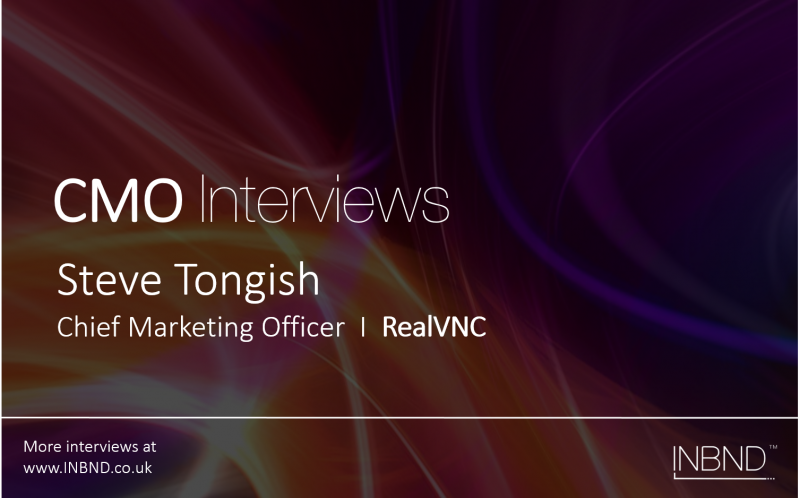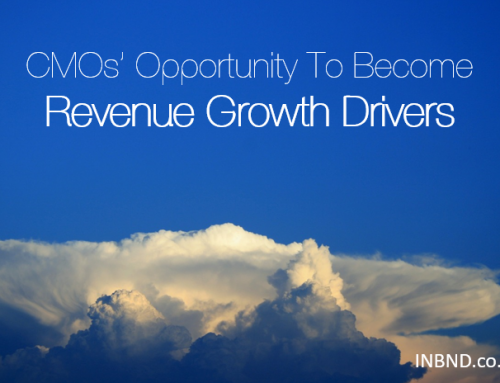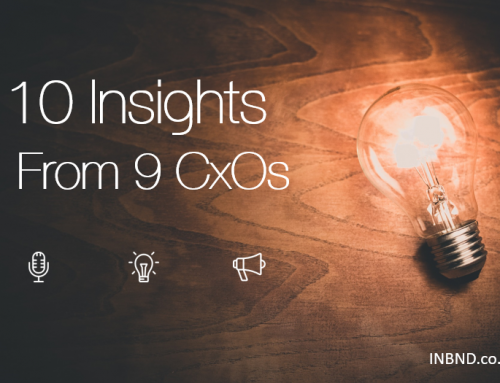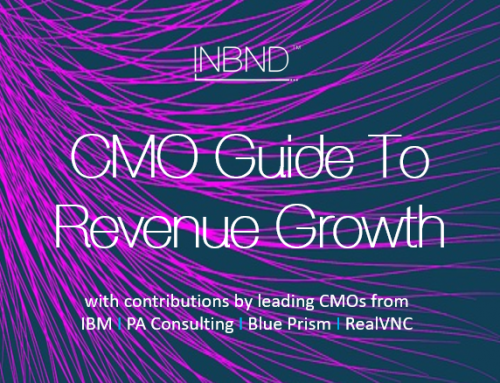The CMO Council and Deloitte found that the role and mandate of CMOs globally are changing towards a more revenue-oriented approach. However, the reality in 2017 is that often this is not reflected in practice. Read this interview with Steve Tongish, CMO of RealVNC, about his view of what the revenue focus should be for today’s Chief Marketing Officers.
In a new series, INBND interviews CMOs from a variety of backgrounds and companies to dig deeper into CMO opinions, concerns, visions and strategies. Do they reflect the CMO Council’s findings and do CMOs agree with their apparent new mandate of growth?
In this interview with Steve Tongish, INBND’s Managing Director Lev Cribb finds out more about the RealVNC Chief Marketing Officer’s views on marketing, growth and revenue – and where the modern CMO fits into the equation.

Hello Steve, perhaps we can start with yourself. What is your background and what path took you into the role of CMO?
Sure, I graduated university with an engineering degree and joined a CAD/CAM software company. My first job was in training, teaching our customers how to use our software. This evolved into a product management role and as I moved to other enterprise software companies, I took on responsibilities for business development, channel management and marketing. I have been focused on marketing for the past 15 years with large and small B2B technology organizations.
Can you tell us a bit more about your own revenue growth focus – did that come naturally with a background in engineering?
For me, my revenue growth focus is something that evolved over time. My engineering background certainly lends itself to a stronger analytics focus. But it has evolved alongside marketing technology such as Marketing Automation, which has been around 10 years or so. I saw the benefit of adopting marketing technology and analytics early on.
I have worked in a range of environments. Some were constructive and positive in the way sales and marketing dealt with each other, but some were more challenging. Having your act together when it comes to analytics is a great way of making your position clear. In some organisations, there can be some finger-pointing (not in my current organisation, I might add), when marketing passes leads over to sales and sales doesn’t follow up on them. This situation can quickly escalate from both sides – sales and marketing. For marketing, good analytics can reinforce the lines of responsibility. That insight puts everyone of level playing field, and should help to avoid confrontation. But you’ve got to handle the individual situations as they arise, and numbers strengthen your hand when there are different points of view.

What allowed you the step into the role of CMO?
My path to the role of CMO was an evolution. As you progress you take on more responsibilities. As you can see from my Linkedin profile, I have moved between companies and each time it allows you to step up your role. The company I’m with now is smaller than previous organisations I have worked for, which allows me to use my skills in a broader CMO role. Ultimately, sometimes things and careers can’t be planned and it comes down to circumstance.
With a view to technology and analytics, marketing as a profession has changed a lot in the last ten years and I’m a bit of a covert in this sense. It’s not all about the numbers though and you have to be able to exercise the softer marketing skills. But when it comes to growth targets I think you have to be quite hard-nosed about it now
In your opinion, who holds the responsibility for revenue growth: Sales, Marketing, or the C-Suite? And why?
In my experience, the responsibility for revenue growth must be actively shared between Sales and Marketing, driven by the business objectives of the executive team. If the growth objectives and program execution are not shared by both organizations, it will inevitably lead to conflict. Unfortunately, conflict between Sales and Marketing is all too common. This can only be avoided by very strong executive leadership with clear and consistent objectives. Sometimes Sales and Marketing are given conflicting objectives and incentives by the executive team in a vague hope that this will somehow come together. This is recipe for massive inefficiency and potential disaster. Sales and Marketing must work with common purpose and vision.
Who should take the lead in bringing the parties together?
I suppose a lot depends on the organisation, because people’s personalities are different. In general, the CEO has the responsibility to set the tone and objectives, and measure people against those objectives. If there is inconsistency at that level it can be problematic. Sales and marketing can work together, if the CEO doesn’t have the vision, but then it comes down to incentives. By default, sales are focused on their reimbursement strategy – I don’t mean this in a bad way, it’s just the way it is. And that can be driven from the top when sales are expected to “do whatever it takes to make their numbers”.
It needs strong executive leadership with vision to use CRM and MA consistently to drive growth in the right areas. If you want to take the business in a certain direction, but sales are not incentivised properly, then the necessary change won’t happen. That’s got to be driven from the top. For example, I’ve never seen a CRM system that’s been fully adopted without strong top-down leadership. It’s binary – either it gets used properly and it’s good data, or it’s not. There’s not a lot of grey area there.
In your opinion, what is the best way for CMOs to influence and drive revenue growth?
Take control of demand generation with well-defined campaigns, tools and metrics. The importance of Marketing Operations cannot be overstated. The CMO must give the executive team the metrics they need to run their business and make informed decisions. If you do this, you will create the influence you need to drive the growth agenda. There is nothing particularly fluffy about marketing anymore.
Has this changed during your time in a senior marketing role?
That’s been more of a recent change. It comes down to marketing automation and analytics tools. The change in technology has been so significant that even 5-6 years ago we had no marketing operations role – it just didn’t exist. But it’s the first thing I put in place at this new role. This new technology is of such significance that it has really brought to the forefront a change in thinking. For me it’s a welcome change. At the executive level this allows marketing to influence the agenda, because we have the analytics to strengthen our hand.
In the past, marketing has been more reactive. But it’s changed. There are so many moving pieces in an organisation and marketing plays its part. To work effectively the whole organisation has to be synchronised technologically, which is no small task. It is also important to stress that this can’t be easily done without a common vision. If everyone knows the direction they’re heading in, then your odds of success are much higher. Marketing plays a big role in enabling this common vision.
How can CMOs ensure they drive growth and continue to fulfil the traditional role of the CMO as brand ombudsman and ambassador?
With an integrated marketing strategy, these go hand in hand. It will always be the case that some activities are more easily measured than others, but the more competent your marketing analytics are, the more space you create for secondary objectives. This said, the syndication of quality thought-leadership content can be directly tied into metric driven campaigns with their own objectives. If you are a household B2C brand, this situation may be very different. However, for most B2B businesses I think that brand promotion should be integrated into your more structured campaign activities.
Given the growth and development of marketing technology, how technical should a CMO be today? Does a non-technical CMO have a disadvantage when it comes to driving revenue for a modern organisation?
Like most things, it’s a balance. It is very important to understanding the scope and capability of marketing automation, web technology, CRM systems and analytic tools, but it is impossible to be an expert in all areas. Even within larger organizations you may well need outside experts in key areas. For example, we use a consultant for our Google AdWords strategy because it is a skill set we cannot afford to cultivate in-house (the ROI isn’t there). Understanding and embracing the possibilities enabled by technology is essential, but for this you don’t need to be a tech expert. It would be wrong to focus on tech alone. The more traditional marketing skills of messaging and strategy remain vitally important.
What is the best business advice you have ever been given?
One small action is worth a thousand words (Ai Weiwei). For me this means that you shouldn’t try to make things perfect before moving. There is real value in action. Naturally, there are exceptions that require perfection, but in most cases, a timely, good quality starting point that can evolve is better than the perfect project that never sees the light of day.
What is your favourite business book, and why?
I think I would go with a classic: “The 22 Immutable Laws of Marketing” by Al Ries and Jack Trout. This book has been around forever, but it is a good sanity check to ensure you stay focused on the basics. We can all too easily get lost in the details and this book reminds you there are certain fundamental truths that do not change. I try to skim through this book each year in order not to lose sight of the big picture.
Thanks for giving us your insight, Steve.
You’re welcome, I enjoyed the process!
For more information about RealVNC, go to www.realvnc.com, or connect with Steve Tongish on Linkedin.
About INBND Growth Marketing:
INBND provides Growth Marketing Consultancy Services to B2B organisations.
Lev Cribb started INBND to address one big problem: the disconnect between lead generation and sustainable revenue growth. Or in other words, between marketing and sales. He saw too many companies grow inspite of their lead generation efforts, not because of them. INBND brings the passion, expertise and focus to drive change in your organisation. Get in touch today and find out how a modern approach to revenue generation can help accelerate your growth.










